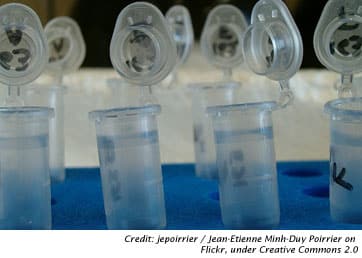
 (WOMENSENEWS)–Throughout the country we hear constant outcry about DNA rape kits that never get tested.
(WOMENSENEWS)–Throughout the country we hear constant outcry about DNA rape kits that never get tested.
Women’s eNews has run commentaries about this supposed outrage and just two weeks ago The New York Times reported on a presumably shocking stockpile of untested kits in Texas. A couple of years ago, New York Times columnist Nicholas Kristof compared the problem to something more likely to occur in Afghanistan than the United States, which turned up the clamor about untested kits.
Hold on.
The U.S. legal system may be embarrassingly bad at providing meaningful redress for rape victims, but untested DNA kits are not the problem. To the contrary. Public attention to the untested kits makes the problem of systemic injustice worse because it saps precious resources and distracts us from the real issues.
DNA testing is not only a red herring wrapped up in a Trojan horse, it’s a gigantic neon whale, stuffed inside a Trojan elephant-in-the-room.
Rape kits may be stacked up in criminal evidence closets all over the country, but not because there isn’t enough money or political will to demand testing. It’s because as many as 90 percent of the kits contain evidence that is, at most, irrelevant.
Eighty-five percent of victims know their attackers and the defense is focused on consent, not whether the act occurred. In such cases, DNA tells us nothing about the issue in dispute. A rape kit could contain the DNA of three men, five sheep and the Loch Ness monster, and it would have nothing to do with whether the victim consented to sex on the night in question.
Ugly Legal History
The United States has an ugly, historic and pervasive habit of prosecuting a far greater percentage of theft crimes than sex crimes, and punishing thieves more harshly than rapists, which partly explains why rape is the least reported of all crimes. Why would any woman bother to call police when studies show that victims are often blamed for the man’s crime and only 2 percent of rapists spend even one day behind bars?
But that problem isn’t caused by the failure to conduct expensive tests on tens of thousands of untested rape kits. It’s that we live in a culture where women’s bodies and rights are disrespected by violent men and have a legal system that refuses to hold them accountable.
This well-known concern notwithstanding, it’s hard to find a newspaper or advocacy organization that hasn’t written, instead, about the need to test "all" old rape kits.
Human Rights Watch at one point found that over 12,000 kits in California went untested for years.
Kristof and others seized on this for outpourings of outrage.
But 90 percent of those 12,000 cases involve victims and perpetrators who know each other. That means only about 1,200 kits should even be considered for testing. Of those, there’s a good chance a majority will be rejected for testing because studies have long shown that many rapists do not ejaculate.
If we tested only the small minority of cases where DNA might actually help elucidate the truth–or where the offender is unknown–we’d have a much smaller backlog of kits stacked up. This targeted use of resources would, in turn, free up funds for expedited processing in the stranger rape cases where DNA is critically important.
Violations of Privacy
 If wasting money were the only problem, I might not be so cranky.
If wasting money were the only problem, I might not be so cranky.
But conducting needless tests on already traumatized victims causes gratuitous violations of privacy and due process rights; not only for victims but also for their consensual sex partners, who can get dragged into these cases.
The government has no authority to conduct invasive tests on a victim’s constitutionally-protected bodily fluids unless such tests are ordered by a judge after a hearing where the tests are deemed necessary to resolve an issue legitimately in dispute at trial. Since almost all rape cases involve a consent defense, few of these hearings will take place, and even fewer will be successful. As it should be.
The way it works now is not only backward, it’s nutty. Medical professionals working as agents of the government inject medical implements into the victim’s body cavities and take samples of deeply personal biological material.
The victim typically signs a document indicating she consents to the intrusion, but she has no knowledge at that time that the examiner may uncover information about her–such as HIV status and DNA from consensual sex partners–and that this material will unfairly be shared with the defense, used against her at trial and revealed in public documents and in open court.
There is no "knowing, intelligent and voluntary" consent to the testing because she has not been provided with a full understanding of the consequences of her consent. There is no due process or court hearing to ensure that only truly relevant and material evidence is obtained. No warrants are issued. Nothing. It’s like the police entering your home without a warrant and conducting a search of your medicine cabinet after you agree to let them in because they told you they’re looking for an escaped murderer.
Bottom line: If there’s a rape kit sitting on a shelf, chances are it’s not proof of some grave injustice, but rather, evidence that a victim’s privacy rights are intact.
Wendy Murphy is an adjunct professor at New England Law/Boston where she teaches a seminar on sexual violence. She’s a former sex crimes prosecutor and author of "And Justice For Some." An impact litigator who specializes in violence against women, Murphy consults and lectures widely on sex crimes, violence against women and children and criminal justice policy.


